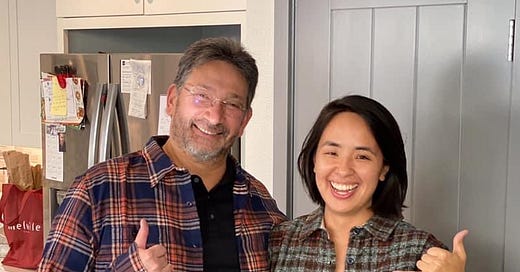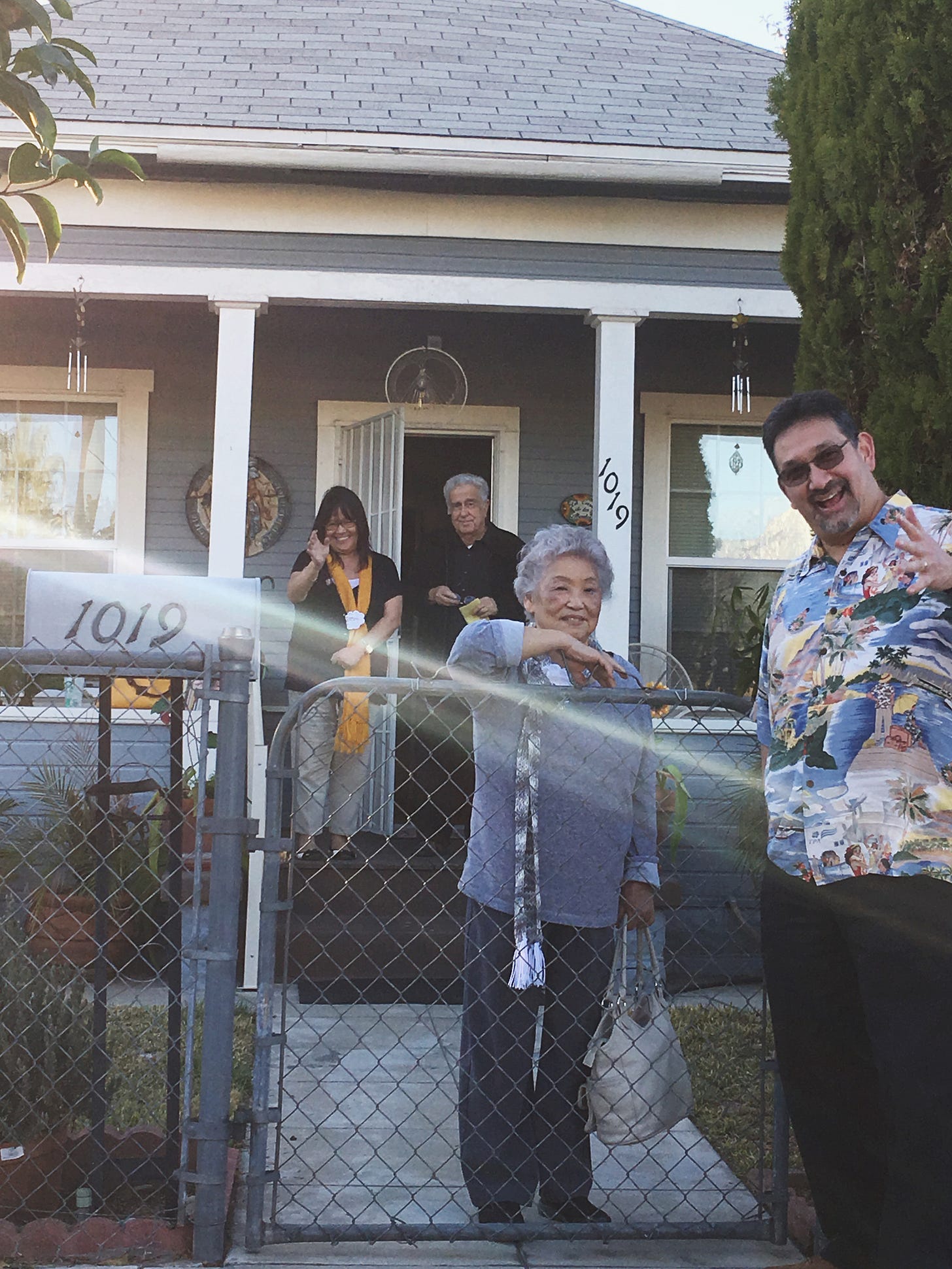Hello again, internet.
It's so nice to be with you once more. In this way— in writing, my favorite form of communication. The form that makes the most sense to me. Where I attempt to make sense of myself, and the world. Which I guess is the point of this substack— to attempt to answer the unanswerable question of what are we even doing here? A question, that at 22, I surely thought I would have escaped by now. And yet, let’s just say that at 33, I understand better each day my dad's response to Oprah's famous question, "what do you know for sure?"
"I know for sure that I know less and less each year." He laughed.
He would have been around 50 when I asked him. Me? 22, a depressed college grad desperately looking for answers to life’s big questions. I won’t lie when I say his answer took me by surprise. I love my dad, but humility wouldn’t be the first adjective I’d use to describe him, at least when it came to his imparting wisdom in my life. In the rest of his life, he was generous, humble, and hard-working. To me, his child, a bit of a hard ass. The classic tale of the immigrant, or in his case the immigrant plus— i.e a refugee. Those destined to both wander and wonder for the rest of their lives. Wander a new society forced upon them. And wonder what might have happened if they hadn't had to leave, if they had been granted the most simple of human needs — a home.
For me it's refugees, more than any other group, who understand the real meaning of the word nostalgia. Nostos, Greek, meaning “to return home.” Algos, also Greek, meaning “pain.” Nostalgia then being, literally, the pain of returning home. Or in the case of the refugee, the pain of being unable to return home.
I saw that pain in my dad’s demeanor throughout his life, and even up until his death. And ironically, it is because of his passing, that I now understand that same pain more viscerally than I ever had before. The nostalgia I feel for my dad’s presence; the same he felt for Cuba — a longing to return to a home that doesn't exist. A home reduced to mist and memory. No longer a physical object, person, or place, but rather an emotional touchstone. A memory whose warmth you can only emotionally drape over your shoulders as a shelter from the stark loneliness of big, vast, impersonal world.
My dad only returned to Cuba once. When he was 40. I was in fifth grade and puzzled by the odd mix of melancholy and mania that he vacillated between throughout our trip. Staring at his old house, holding his younger child's tiny hand clasped in his surprisingly soft, but ever determined hands. The hands of a dentist, a father, a husband, and once a boy who clawed his way out of communism, through a new language, a new profession, a new land, and somehow had ended right back where he started— his home. Only with a lifetime of life wrangled over, wrestled with, and earned, in between those twenty years.
It was precisely all that “life” that had transformed the building stood before him from once his home, to now just a house. Like Cinderella's carriage turned into a pumpkin at the stroke of midnight. The magic gone in an instant, returned sadly to no more than the sum of its parts. I have experienced this strange phenomenon only a few times in my life— the sudden transformation of one space from a home back into a building. And each time I felt the pain of Nostalgia’s call.
I experienced the first glitch in my own matrix— a home disappeared— when they converted my elementary, middle, and high school campus into a Lexus dealership. If I close my eyes, even now, I could pace out every classroom, bathroom stall, and hallway to its exact proportions. I could point out the places where the pavement had cracked, or the poppies had burst through the chainlink fence at the very edge of campus — the side that abutted the apartment buildings behind the school. Where we found all kinds of jagged artifacts from "the outside world," the secular world, separate from our neat little Christian bubble.
We found cigarette butts, lighters, and condom wrappers (though there was no way we knew what they were for.) And we prayed for our neighbors, no doubt lost to the world, consumed by its chaos. We, “Christians,” on the other hand sitting safely "in the world, but not of it." A big point of pride for the most pious among us. "NOTW" (not of this world) decals gracing only the coolest of the Christian mini-vans in a script adjacent to a graffiti. You know, for not wanting to be "of this world" we were certainly always desperate to co-opt its coolness. But I digress. All this to say, when they turned Escondido Adventist Academy into a Lexus dealership, I lost my first home.
The second home I lost was after my abuelo died. They moved my abuela into the houses of my tias, and just like that, la casa de mis abuelos, the haven of my childhood, disappeared. It turned into a rental property, our parents deciding to gift the title of the house to us five grandchildren. No longer a safe haven, now just a rental property. Sadly, my abuelos were only a two payments short from owning their first, and only American house, outright. So close to closing the deal on the American Dream. Ironically, upon his death, my dad was also only a few payments from owning his dental office in Escondido, outright. He too was denied that relief.
For as long as I can remember, my dad would recount to me how close he was to paying off his debts. On the way to school, or while I watched him pay the bills, or open the mail; he was always counting down the days to being free. First he paid off his dental school debt, then the loan for the equipment for his office. And now, in just a few months, he would finishing off paying his mortgage to the building he built his practice in. He would finally own something outright— a true asset. Owning property outright the real dream of every Cuban denied the right to ownership in their homeland. He never got to feel that joy. He died just a few months shy of that bliss. When I sold his office, I lost another home. Passing the keys of his life’s legacy to a new dentist. One whose life story wasn’t too dissimilar from his own— a hardworking immigrant with two young children, ready to forge her own path.
And finally, a few years back when they turned the DeLongpre campus of BuzzFeed— where I spent the majority of my twenties forming my first professional identity— into Netflix's new mega campus, I once again said goodbye to a home. Now, whenever I drive past those few blocks of Hollywood, my heart turns over in a manner I can't quite express. Or maybe I can? It's pain, the algos. I want to return home, to the place where I spent so many years becoming, but physically cannot.
I don't know about you, but 2023 has fully kicked my ass. Or rather is still kicking my ass— as in currently. Life, once again, forcing me to redefine my concept of a home. Between the writer's strike stripping me off my work, torrential January rains tearing literal holes through my bedroom's ceilings, and elective top surgery recomposing my physical shape — my homes, both literal and physical, are once again being stripped from me. Often pried from my white-knuckled grip. "Let go," the universe screams in the softest whisper. You are not your attachments. You are your own home. Or you should be.
That is where I am right now— in the midst of becoming my own home. Not because I wanted to, but because life has once again forced me to. I must become my own touchstone. No longer can I simply attach my entire sense of self to my next home, like a hermit crab reaching for a new shell. Become your own home. Your own touchstone.
I looked up the origins of touchstones. It turns out they were actual stones, typically black quartz, used in the 15th century my metal workers to test the purity of gold and silver. They would literally touch the stone to the surface of the gold or silver, and then depending on the mark it left, purity was determined. Touchstones were a measure of one's composition— once literally, and now perhaps, more metaphorically. Our modern touchstones being the people, places, or objects that tell us we're home. That make us feel safe when we feel far from ourselves, when life throws us for a loop.
But if I am learning anything from life right now, it is that my current touchstones are still too far outside myself. And despite their preciousnesses and proximity, I must be my own touchstone. No longer can I make a marker of my physical home, the latest job title on my resume, or even from the sacred identity of being my dad's daughter. Because despite the importance of these place and titles, their problem remains they will always exist outside of myself. And are therefore subject to being taken away.
So for me, at least, this is where I am — building a home within my own heart so that I can always be safe with myself. So I can lessen nostalgia's sting, by being able to return to myself. Whether that is the answer? I can’t know for sure, but it’ll have to be good enough for now.
So thank you, internet friend, for being here with me again— reading my words. I've missed our chats.
xx,
Ash
coda:
Blergh, dear reader. I hope that wasn't too much melancholy for a random Wednesday. But like, life, huh? Just when you think you're good— BAM!
*insert gif of Emma Roberts saying surprise, bitch!"*
But the good news is, like Zac Efron so presciently stated in one of the greatest DCOMs of all time, “we're all in this together." Which I believe is laymen's for: I'm just as fucking confused as you are. The most reassuring message of them all.









this is giving me life and also flashbacks to your blog when you were overseas after college! so happy to be back here with you :)
Thank you so much for sharing this. So well written. Leaving a place/ state that felt comfortable and home-like really is very emotionally intense. (And never thought of how similar gender transition feelings can feel to that at times, when moving away from the practised familarity of cis gender expression). Feeling inspired by the idea of gradually becoming ones own home. Subscribed and looking forward to reading your further substack posts.